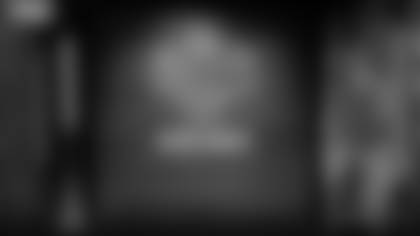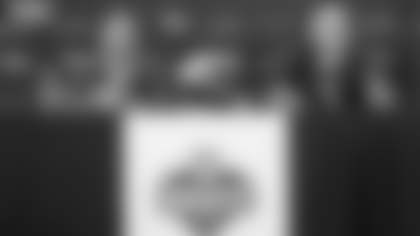The Broncos' most interesting player may also be the least well-known person on the roster. Punter Corliss Waitman, who joined the team earlier this year, was born in Belgium, raised in the Netherlands and went to college in Mobile, Alabama before becoming a full-time NFL player. Before practice recently, we sat down with him to talk about his childhood in Europe, what it was like to be named AFC Special Teams Player of the Week and more.
Ben Swanson: Earlier in the season, you were named AFC Special Teams Player of the Week. To be still so early in your career and to get an honor like that, what does it mean to you?
Corliss Waitman: "It was kind of a big deal. I didn't realize it. I had a lot of those guys that made tackles for me inside the 20, had a lot of good snaps from 'Bob' [Jacob Bobenmoyer], good protection. It takes everybody. It really does. Because if those guys don't block, it's going to be a blocked punt or I'm going to feel the pressure. It was definitely an honor. And it's definitely a team award, in my eyes. All those guys — the gunners, everybody that's blocking for me, Bob, the snapper, and it all came together. We actually earned that together. But it was definitely surreal; it's still surreal. I kept saying it in the last interview. I can't believe that this is my life, because where I come from, how I grew up — I never thought I'd make it this far, because I've been cut, doing workouts. I never thought. Not doubted myself, but I never thought I'd make it this far to become a starter, so I'm very grateful for it."
BS: Being a left-footed punter is somewhat rare and advantageous. Why is there a benefit to that?
CW: "It's kind of like baseball; it's just a little bit different. Different spin, [but] it's not just a different spin. Lefties have this weird — you can ask returners — it just knuckles sometimes in the air and stuff. It's one of those things, but it's one of those things returner can work on and get used to. But you notice when it's a lefty punter sometimes they muff it here and there. It's definitely an advantage going against a returner — sometimes. Those returners are professionals, too."
BS: Being left-footed, are you also left-handed?
CW: "Everything left. I'm left-handed, left-footed."
BS: How far can you punt with your right foot?
CW: "Let's say, not far enough to be an NFL punter. Let's just say that. Maybe high school? But not far enough to become an NFL punter."
BS: When you were coming into the league, you did a lot of tryouts, right? What is the life of a guy doing a lot of tryouts and trying to make their way into the NFL?
CW: "I was definitely grateful. For me, it was like a game every week, because I was a lefty and guys were bringing me in because they were punting against lefty punters. So for me it was like, 'OK, that's my game. I'm going to treat it like a game day.' And I did very well, racked up a lot of [frequent flyer miles] with it. That's what I'm really grateful for, because I'm a gold member now. But it was definitely a grind, because you're always flying out and stuff like that. But it was kind of like it kept me ready and got me an opportunity here, because I did a workout here in October."
BS: You landed in Pittsburgh for a little bit with Pressley Harvin III. There's not a whole lot of Black punters or specialists in the league. To be able to work with another guy who can share that experience, what did that mean to you?
CW: "I knew Pressley before we both made it to the league. I knew him in high school, college a little bit too. It was definitely odd, because we're the only two and we're both on the Steelers. So it was kind of cool. And Pressley is a good dude, and a great punter as well. It was a good vibe being there with him. My rookie year I was there, and then I got cut and when I came back he was there. It was definitely one of those weird coincidences."
BS: You've talked previously about having a lot of pride in your Surinamese heritage and possibly being the only NFL player with that background. How much time did you spend there growing up, and what can you tell me about what the country is like?
CW: "My mom was born there. It's a Dutch colony, so that's why I speak Dutch. My mom moved to the Netherlands, but my mom was born there and I've been there plenty of times. That's my mom's heritage, so I take a lot of pride in it. It's a third-world country, so I really want to make sure I represent it. I had to pick between the Dutch flag and the Surinamese flag and, no offense, we've got so many professional Dutch soccer players, so many kickboxers, UFC fighters, so I had to make sure I just represent the country that's not as represented on the global scale. I had to make sure I represented that flag for all my people there and my mother, of course. I take pride in it, of course. I want to represent because a lot of those people are not heard. A lot of people have never heard of that country, you know what I mean? So I really want to represent it. I put it on my helmet those last two weeks for the games [in Weeks 4 and 5 as part of an NFL initiative]. It's important to me because it's where my mom is from."
BS: I hear you speak several languages. Is that true?
CW: "I do. I will say this: I speak fluently — actually fluent fluent — two. When I grew up, I was born in Belgium, I spoke a little bit of French, because I speak Flemish, which is like Dutch, what I speak. And a little bit of French. But I lost most of the French. One thing about language is, if you know more than one, it's easy to learn more. I'm probably going to start to learn a little bit more. Spanish, for sure, because I'm from Florida, so it's a lot of Spanish-speaking people — and in Colorado, as well. I'm probably going to pick up Spanish. I've been talking to Miss Wendy, one of the chefs. So probably going to pick up Spanish and maybe French, as well. We'll see."
BS: How many years did you spend growing up in Belgium and the Netherlands?
CW: "Pretty much 15 years. My dad is from Florida, of course. My dad was playing basketball overseas, met my mom there, and I ended up growing up there, pretty much, for like 14 or 15 years. I used to go to Florida all the time in the summer, see my dad and stuff like that, because he's from Pensacola and used to be there. So I wasn't like a stranger to America. But when I was 15, I moved for good."
BS: The culture shock going from Europe to Florida must have been significant.
CW: "It's definitely different. … What I've noticed now, it's definitely coming together. When you go to Europe, you dress the same now. Europeans used to dress a little different, but now everything's more fitted. … The mindset's still a little different, but it does have its similarities, for sure."
BS: When you think back to growing up there, what did you like most about living in the Netherlands?
CW: "It's easy to find fresh food. The portion size, of course, is different. It's less greasy and stuff like that. That's the main difference. But I love my donuts here, I love my burgers and stuff like that. But the best thing that I had in Europe is it's so diverse. I lived in Amsterdam for most of my life [there] — super diverse, so multicultural, everybody embraces each other. That's the main thing I've noticed about Europe. They're a little ahead when it comes to mentality. Because I grew up in the south, so it can be backwards sometimes, but Europe is very multicultural where I stayed, where I lived. Super multicultural. My school was full of different ethnicities, races, religions. You just coexist."















